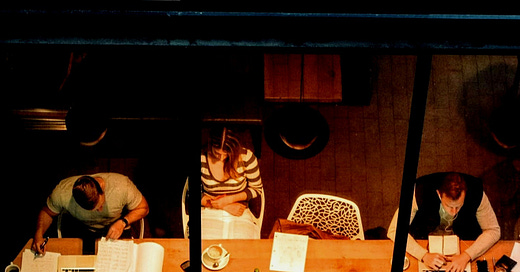Diary of a Recovering Workaholic, Doer and Thinker
Unwinding Addictive Patterns and Opening Up to Sacred Paths to Life and Work
January 9, 2025 | Zurich, Switzerland
Work as an Addiction
I’m a second-generation workaholic.
I’m not sure if workaholism goes further back, but based on my memories, I believe it started with my mum and dad. They are the hardest-working people I’ve ever known.
As my regular readers know, I was born in a communist country. On the surface, communism is often thought to discourage hard work and ambition. Many economists argue that the lack of private enterprise, combined with the high income equality, stifles the drive to achieve more. That’s often used as a justification for why the growing inequality in the world is not an issue we need to be concerned with. Simply put, they believe that if you have no opportunity to earn more money, you won’t try harder. When this mindset is multiplied across an entire population, it supposedly results in a lack of initiative, innovation, and growth.
Well, there is some truth in that, but they are also wrong for at least two reasons:
First, in my experience, people are motivated by upward social mobility far more than by money. This is difficult to observe in a capitalist society because these two factors are usually intertwined, unlike in a communist society.
Second, hard work can be driven by entirely different things, and that’s what I want to focus on today.
How is hard work different from workaholism?
In my article, “Chances are you're addicted. Most of us are,” I wrote that when we think of addictions, we often focus on substance addictions (e.g., alcohol, drugs, food, etc.). However, more interesting—and far more widespread—are the so-called process addictions. These involve activities or interactions that “hook” a person or on which a person becomes dependent. Common process addictions include work, sex, money, gambling, religion, relationships, TV, movies (especially series), shopping, traveling, gaming, social media, smartphone usage, and selfies. Activities like jogging, fitness routines, spiritual practices, and certain types of thinking can also become addictions.
In fact, almost anything can turn into an addiction—just as a herb, taken in the right quantity, can heal, but in the wrong quantity, can harm.
An addiction serves as a buffer between us and our awareness or feelings. Whatever our addictions may be, and no matter how innocent they might seem, we use them to numb ourselves from emotional pain and trauma, including the trauma caused by the separation from our true and whole self, from others, and from the rest of Nature. This separation leads to a profound loss of meaning.
A challenge unique to workaholism is the difficulty of distinguishing between hard work (which is a virtue) and workaholism (which is an addiction). In an attempt to differentiate, I will share a quote by Anne Wilson Schaef that profoundly touched me when I read it 20+ years ago: “Work is sacred. It is not just a way to earn money or gain power, though it may result in both. Work is a vehicle for testing out our gifts and talents and using them to explore their meaning. Work is a process of self-expression, trial-and-error learning, creativity, and risk-taking. No matter what kind of job we have, work always has these potentials. Work is spiritual. It is a place where we have the opportunity for spiritual growth. Often these opportunities come from the ‘how’ of the ways we do our work rather than the ‘what’ of the work itself. Regardless of what our work is, we can enjoy it. And it is most enjoyable when balanced with other aspects of our life and not a tyrant.”
Work becomes an addiction when we use it to escape other aspects of our lives.
Even so, it’s not always easy to recognize. Some of us are fortunate enough to experience work that feels sacred and purposeful—a way to contribute to life. This is often how we justify neglecting other aspects of our lives. This phenomenon has become increasingly common in recent years, especially with start-ups driven by the pursuit of purpose. In my article, “Fake Tales of Entrepreneurship, and Tales of Businesses Devoid of Sacredness,” I delve deeper into the narratives of success, purpose, and the genuine risks and rewards of entrepreneurship.
Work becomes an addiction when we pour most of time and energy into it and derive our sense of belonging or purpose solely through work.
More often than not, it’s caused by the void and sense of disconnection left by trying to avoid what may feel too painful to confront.
And that brings me to the larger topic:
Doing as an Addiction
Step by step, we have all become part of a highly individualistic, urbanized, and materialistic way of living, which accompanies the upward social mobility I discussed earlier. The more we advance in life, the more we find ourselves in constant doing. We equate success with productivity, efficiency, achievement, and busyness, often at the expense of our well-being and deeper connections. This relentless pace leaves little room for stillness, introspection, or simply being. We add to that the pursuit of experiences which are supposed to fill the numbness we feel but they end up just adding to the doing as well.
Over time, we internalize the belief that our worth is tied to a checklist of achievements and experiences rather than embracing the sensation of being alive in the present moment.
Such a checklist may be work-related, but it can also include traveling, gaming, shopping, fitness, meditation, social media, and of course the phone screen.
This focus on doing subtly detaches us from the things that truly nourish our souls, like relationships, community, nature, creativity, and the simple joys of being alive, such as smelling a forest after rain, watching the flow of a river, or seeing children playing.
This relentless focus on ‘doing over being’ erodes our connection to our senses and deepens feelings of disconnection, numbness, and emptiness. We often seek new experiences to fill the void, but that only intensifies the addiction.
A Note for Purpose-driven Entrepreneurs and Independents
Most advice for small entrepreneurs, coaches, writers, and independent professionals involves a never-ending list of tasks. At some point in my independent career, I realized I had signed up to do something I love. However, I was spending only 5 to 10% of my time doing it, while the rest was consumed by mindless activities like building a social media presence for example.
Following advice that keeps us constantly doing disconnects us from the meaningful expression of our soul’s essence—which is what we signed up for. So, here’s my advice:
Ditch all the advice that involves lots of mindless doing, and focus only on what fills your heart. That also means leaving time to connect with your heart.
Everything else widens the gap between you and success and adds to the noise out there. It also harms your well-being and leads to burnout.
And finally:
Thinking as an Addiction
The further we go with this list of addictions, the larger the number of people affected. This suggests many of us are caught up in the cycle of doing, while an even greater number struggle with an addiction to thinking.
All addictions disconnect us from life’s sacredness. The worst, however, is thinking because it persists even in stillness.
So, what’s wrong with thinking?
That’s how we make decisions, accomplish things, and succeed.
Yes, but thinking can only guide us so far. No matter how effective our thinking is, it often leads us to a place where an AI would take us faster.
The ultimate connection to deeper knowing occurs without thinking. It emerges from our intuition and the act of creation.
In my article, ‘When we fear AI, who are we really afraid of?’, I discuss this in greater detail.
What then?
Like food and work, doing and thinking, are essential parts of life. This makes these addictions hard to heal because we cannot stop doing them. For an alcoholic in recovery, the journey begins with stopping drinking forever. But we cannot stop eating, working, doing, or thinking. That doesn’t make sense.
In my view, recovery requires three essentials:
Being willing to experience and understand all emotions
On one side, that’s about becoming aware of them, accepting them, learning to differentiate them. On the other side, it’s about not identifying with them and experiencing ourselves as something way more precious and expansive.Learning to connect to and trust our intuition, wisdom, creativity, and joy.
We all use these words, and yet, we don’t always recognize that connecting to them means embracing our spiritual nature. Most addictions are in fact caused by our separation from it.Connect with others on the same path.
From a certain point onwards, we can’t learn only from blogs, books and workshops, and we can’t Google our way out of challenges. They are learned through interactions and collaboration with diverse people at a similar path.
In my previous article ‘Chances are you're addicted. Most of us are’, I discuss addictions in bigger detail. As I wrote there, the question is not whether we have addictions but how to prevent them from controlling our lives so we can be the joyful, prosperous, and fulfilled person we want to be.
It’s also about learning how to be a successful entreprenuer, professional, or executive without the burnout, without the stress and without loosing ourselves on the journey. These are some of the things we will be discussing in the Doers & Workaholics Redefining Success Circle of Heart-to-Heart—all about shedding the busyness mindset, shining our true light, and discovering sacred paths to work and success.
Check also:








This really resonates. Your posts inspire me to connect to and honour my real self.
On the list of addictions, 'demonstrating that I am right' has been standing out for me recently. Something for me to learn no doubt!
I'm curious about 'hard work being a virtue'. This struck a bad note for me as it seemed to be aligned with 'work is supposed to be hard'.
I would value your reflections (whilst noting what could be taken as my desire to be right 🤣)
love
love
love
love what you write